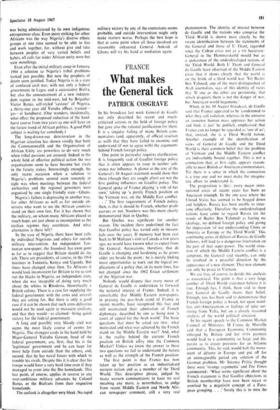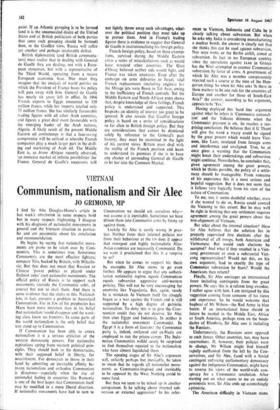What makes the General tick
FRANCE PATRICK COSGRAVE
In his broadcast last week General de Gaulle not only described his recent and much- criticised actions in the field of foreign policy but gave also the rational justification for them. It is a singular failing of many British com- mentators (and, apparently, of official reaction as well) that they have failed to examine and understand (if not to agree with) the arguments behind French foreign policy.
One point in particular requires clarification. It is frequently said of Gaullist foreign policy that it often appears to issue in neither sub- stance nor influence. A glance at the text of the General's 10 August statement would show that these (though they are sought after) are not the first guiding influences on Gaullist policy. The General spoke of France playing 'a role of her own,' taking up 'a purely French position on the Vietnam war, on the Middle East conflict. . . .' The first requirement of French policy, then, is that it should be French, whether profit accrues or not. Nowhere was' this more clearly demonstrated than in Quebec.
But Quebec was significant for another reason. The incident there underlined the fact that Gaullist policy has varied only in inessen- tials over the years. If memory had been cast back to M Malraux's visit to Canada a few years ago, we would have known what to expect from the General. Accusations, therefore, that de Gaulle is changing and hardening as he grows older are beside the point: he is merely finding more opportunities to work out the logical im- plications of a policy that, in its main lines, has not changed since the 1962 Evian settlement of the Algerian war.
Nobody would dispute that every move of General de Gaulle is undertaken to forward the national interest of France. Indeed, it is remarkable that Middle Eastern newspapers, in praising the pro-Arab stand of France in recent months, have recognised this fact and still maintained their admiration of French diplomacy, described by one as being now 'a court of appeal-for the Arab world.' The basic questions that must be asked are two: what motivated and what was achieved by the French stand on the Middle Eastern war? And, what is the reality behind the current French position on British entry into the Common Market? Unless we know the answer to these two questions we fail to understand the nature as well as the strength of the French position.
The first point is that France has now taken up her position as an industrialised western nation and as a member of the Third World.' This deS-criptive phrise, judged by many western commentators to have no real meaning any more, is nevertheless, to judge from recent Middle Eastern and North Afri- can newspaper comment, still a very real phenomenon. The identity of interest between de Gaulle and the nations who comprise the Third World is shown most clearly by the recent identification between the statements of the General and those of U Thant, regarded since the Cuban crisis not as a UN Secretary- General in the Hammarskjiild mould but as a spokesman of the underdeveloped nations of the Third World. Both U Thant and General de Gaulle have observed of the Middle Eastern crisis that it shows clearly that the world is on the brink of a third world war. Yet Bechir Ben Yahmed, one of the most distinguished of Arab journalists, says of this identity of views that 'If one or the other are pessimistic, that which disquiets them is not the danger of war. but American world hegemony.'
When, in his 10 August broadcast. de Gaulle said that France appeared to be 'condemned to what they call isolation, whereas in the universe an immense human mass approves her action and finds it just' he publicly emphasised that France can no longer be regarded as 'one of us': that, instead, she is a Third World nation. Another example of the identification of views of General de Gaulle and the Third World is their common belief that the problem of Vietnam and the Middle Eastern conflict are indissolubly bound together. This is not a connection that, at first sight, appears reason- able to most British or American commentators. Yet there is a sense in which the connection is a true one and we must make the imagina- tive effort to understand it.
The proposition is this: every major inter- national crisis of recent years has been an American triumph. In the one case where the United States has seemed to be bogged down and helpless, Russia has been unable to inter- vene effectively. Therefore the underdeveloped nations have come to regard Russia (in the words of Bechir Ben Yahmed) as having no ideology, no defined foreign policy and giving the impression 'of not understanding China or America or Europe or the Third World.' This continuing series of defeats of Russia, de Gaulle believes, will lead to a dangerous frustration on the part of that super-power. The world situa- tion of which the Middle Eastern conflict is a symptom, the General said recently, can only be resolved in a peaceful direction by the appearance of a new element. That new element can only be peace in Vietnam.
We are free, of course, to deride this analysis as nonsensical. The point is that a very large number of Third World statesmen believe it is true. Enough has, I think, been said to show that General de Gaulle shares their belief. Enough, too, has been said to demonstrate that French foreign policy is based, not upon mind- less anti-Americanism or feelings of spite sur- viving from Yalta, but on a closely reasoned analysis of the world political situation.
In his recent speech to the Common Market Council of Ministers, M Couve de Murville said that a European Economic Community enlarged by Britain and her EFTA partners would lead to a community so large and dis- parate as to create pressures for an Atlantic community. This, he said, would halt the move- ment of detente in Europe and put off for an unimaginable period any solution of the German problem.• Mr Terence Prittie thought these were 'strange arguments' and The Times commented : 'What seems significant about the French statement is that Gaullist objections to British membership have now been recast or overlaid by a negativist concept of a Euro- pean grouping. . . .' Surely this is to miss the point. If an Atlantic grouping is to be formed (and it is the unconcealed desire of the United States and of British politicians of both parties that some such grouping should be formed) then, in the Gaullist view, Russia will suffer yet another and perhaps intolerable defeat
British diplomatists (and British commenta- tors) must realise that in dealing with General de Gaulle they are dealing, not with a Euro- pean statesman, but with a representative of the Third World, operating from a secure European economic base. Nor must they imagine that the analysis of world politics on which the President of France bases his policy will pass away with him. General de Gaulle has nearly six years left in office. In 1966 French exports to Egypt amounted to 150 million francs, while her imports totalled only 73 million francs. She has similarly favourable trading figures with all other Arab countries, and figures a great deal more favourable with the emerging leader of the Arab nations, Algeria. A likely result of the present Middle Eastern oil contretemps is that a face-saving compromise will be arrived at whereby French companies play a much larger part in the drill- ing and marketing of Arab oil. The Middle East is, as Jeune Afrique recently observed, 'an immense market of infinite possibilities' for France. General de Gaulle's successors will
not lightly throw away such advantages, what- ever the political position they must take up to protect them. And in France's trading figures there is evidence to suggest that General de Gaulle is institutionalising his foreign policy.
French foreign policy, based on these assump- tions, survived during the Middle Eastern crisis a series of miscalculations such as would have wrecked other countries. The Quai d'Orsay believed neither side would fight, and France was taken unawares. Even after the embargo on arms deliveries .to Israel, vital French replacements (including engines) for the Mirage jets were flown to Tel Aviv, owing to the inefficiency of French controls. Yet the Middle Eastern and North African press shows that, despite knowledge of these failings, French policy is understood and supported. This bespeaks an identity of interest too great to be ignored. It also reveals that Gaullist foreign policy is based on a series of considerations so far alien to British foreign policy. But they are considerations that cannot be dismissed solely by reference to the General's past history; they must be examined in the light of his current views. Britain must deal with the reality of the French position and learn to understand its premises if she is to have any chance of persuading General de Gaulle to let her into the Common Market.































 Previous page
Previous page